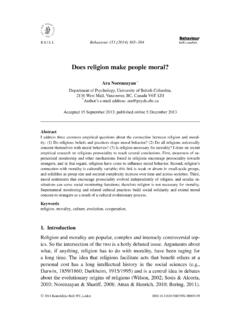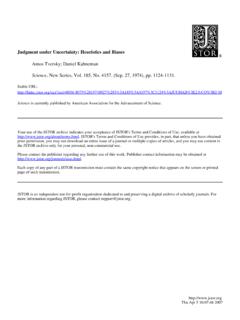Transcription of The weirdest people in the world? - University of British ...
1 The weirdest people in the world? Joseph HenrichDepartment of Psychology and Department of Economics, University of BritishColumbia, Vancouver V6T 1Z4, J. HeineDepartment of Psychology, University of British Columbia, VancouverV6T 1Z4, NorenzayanDepartment of Psychology, University of British Columbia, VancouverV6T 1Z4, scientists routinely publish broad claims about human psychology and behavior in the world s top journals basedon samples drawn entirely from Western, Educated, Industrialized, Rich, and Democratic (WEIRD) societies . Researchers oftenimplicitly assume that either there is little variation across human populations, or that these standard subjects are asrepresentative of the species as any other population. Are these assumptions justified? Here, our review of the comparativedatabase from across the behavioral sciences suggests both that there is substantial variability in experimental results acrosspopulations and that WEIRD subjects are particularly unusual compared with the rest of the species frequent outliers.
2 Thedomains reviewed include visual perception, fairness, cooperation, spatial reasoning, categorization and inferential induction, moralreasoning, reasoning styles, self-concepts and related motivations, and the heritability of IQ. The findings suggest that members ofWEIRD societies , including young children, are among the least representative populations one could find for generalizing abouthumans. Many of these findings involve domains that are associated with fundamental aspects of psychology, motivation, andbehavior hence, there are no obviousa priorigrounds for claiming that a particular behavioral phenomenon is universal based onsampling from a single subpopulation. Overall, these empirical patterns suggests that we need to be less cavalier in addressingquestions ofhumannature on the basis of data drawn from this particularly thin, and rather unusual, slice of humanity. We closeby proposing ways to structurally re-organize the behavioral sciences to best tackle these :behavioral economics; cross-cultural research; cultural psychology; culture; evolutionary psychology; experiments; externalvalidity; generalizability; human universals; population variability1.
3 IntroductionIn the tropical forests of New Guinea, the Etoro believethat for a boy to achieve manhood he must ingest thesemen of his elders. This is accomplished through ritua-lized rites of passage that require young male initiates tofellate a senior member (Herdt 1984/1993; Kelley 1980).In contrast, the nearby Kaluli maintain that male initiationis only properly done by ritually delivering the sementhrough the initiate s anus,nothis mouth. The Etororevile these Kaluli practices, finding them disgusting. Tobecome a man in these societies , and eventually take awife, every boy undergoes these initiations. Suchboy-inse-minatingpractices, which are enmeshed in rich systems ofmeaning and imbued with local cultural values, were notuncommon among the traditional societies of Melanesiaand Aboriginal Australia (Herdt 1984/1993), as well asin Ancient Greece and Tokugawa in-depth studies of seemingly exotic societies ,historically the province of anthropology, are crucial forunderstanding human behavioral and psychological vari-ation.
4 However, this target article is not about thesepeoples. It is about a truly unusual group: people fromWestern, Educated, Industrialized, Rich, and Democratic(WEIRD)1societies. In particular, it is about the Western,and more specifically American, undergraduates who formthe bulk of the database in the experimental branches ofpsychology, cognitive science, and economics, as well asallied fields (hereafter collectively labeled the behavioralsciences ). Given that scientific knowledge about humanpsychology is largely based on findings from this subpopu-lation, we ask just how representative are these typicalsubjects in light of the available comparative justified are researchers in assuming a species-levelgenerality for their findings? Here, we review the evidenceregarding how WEIRD people compare with pursued this question by constructing an empiricalreview of studies involving large-scale comparative exper-imentation on important psychological or behavioralvariables.
5 Although such larger-scale studies are highlyinformative, they are rather rare, especially when com-pared to the frequency of species-generalizing such comparative projects were absent, we reliedon large assemblies of studies comparing two or threepopulations, and, when available, on AND BRAIN SCIENCES (2010), Page 1 of 75 #Cambridge University Press 20100140-525X/10 $ course, researchers do not implicitly assume psycho-logical or motivational universality with everything theystudy. The present review does not address those phenom-ena assessed by individual difference measures for whichthe guiding assumption is variability among such as personal values, emotional expressive-ness, and personality traits are expected a priori to varyacross individuals, and by extension, societies . Indeed,the goal of much research on these topics is to identifythe ways that people and societies differ from oneanother. For example, a number of large projects havesought to map out the world on dimensions such asvalues (Hofstede 2001; Inglehart et al.)
6 1998; Schwartz &Bilsky 1990), personality traits ( , McCrae et al. 2005;Schmitt et al. 2007), and levels of happiness, ( ,Diener et al. 1995). Similarly, we avoid the vast psycho-pathology literature, which finds much evidence for bothvariability and universality in psychological pathologies(Kleinman 1988; Tseng 2001), because this work focuseson individual-level (and unusual) variations in psychologi-cal functioning. Instead, we restrict our exploration tothose domains which have largely been assumed, at leastuntil recently, to be de facto psychological , we also do not address societal-level behavioraluniversals, or claims thereof, related to phenomena suchas dancing, fire making, cooking, kinship systems, bodyadornment, play, trade, and grammar, for two , at this surface level alone, such phenomena do notmake specific claims about universal underlying psycho-logical or motivational processes. Second, systematic,quantitative, comparative data based on individual-levelmeasures are typically lacking for these examination of the representativeness of WEIRD subjects is necessarily restricted to the rather limited data-base currently available.
7 We have organized our presen-tation into a series of telescoping contrasts showing, ateach level of contrast, how WEIRD people measure uprelative to the available reference populations. Our firstcontrast compares people from modern industrializedsocieties with those from small-scale societies . Oursecond telescoping stage contrasts people from Westernsocieties with those from non-Western industrializedsocieties. Next, we contrast Americans with people fromother Western societies . Finally, we contrast University -educated Americans with non University -educated Amer-icans, or University students with non-student adults,depending on the available data. At each level wediscuss behavioral and psychological phenomena forwhich there are available comparative data, and weassess how WEIRD people compare with other emphasize that our presentation of telescoping con-trasts is only a rhetorical approach guided by the nature ofthe available data. It shouldnotbe taken as capturing anyunidimensional continuum, or suggesting any single theor-etical explanation for the variation.
8 Throughout this articlewe take no position regarding the substantive origins of theobserved differences between populations. While many ofthe differences are probably cultural in nature in that theywere socially transmitted (Boyd & Richerson 1985;Nisbett et al. 2001), other differences are likely environ-mental and represent some form of non-cultural phenoty-pic plasticity, which may be developmental or facultative,as well as either adaptive or maladaptive (Gangestad et ; Tooby & Cosmides 1992). Other population differ-ences could arise from genetic variation, as observed forlactose processing (Beja-Pereira et al. 2003). Regardlessof the reasons underlying these population differences,our concern is whether researchers can reasonably gener-alize from WEIRD samples to humanity at radical versions of interpretivism and culturalrelativity deny any shared commonalities in human psy-chologies across populations ( , Gergen 1973; see cri-tique and discussion in Slingerland 2008, Ch.)
9 2). To thecontrary, we expect humans from all societies to share,and probably share substantially, basic aspects of cogni-tion, motivation, and behavior. As researchers who seegreat value in applying evolutionary thinking to psychologyand behavior, we have little doubt that if a full accountingwere taken across all domains among peoples past andpresent, the number of similarities would indeed belarge, as much ethnographic work suggests ( , Brown1991) ultimately, of course, this is an empirical , our thesis isnotthat humans share few basic psycho-logical properties or processes; rather, we question ourcurrent ability to distinguish these reliably developingJOSEPHHENRICH holds theCanada Research Chair inCulture, Cognition, and Evolutionat the University ofBritish Columbia, where he is appointed Professor inboth Economics and Psychology. His theoretical workfocuses on how natural selection has shaped humanlearning and how this in turn influences cultural evol-ution, and culture-gene coevolution.
10 Methodologically,his research synthesizes experimental and analyticaltools drawn from behavioural economics and psychol-ogy with in-depth quantitative ethnography, and hehas performed long-term fieldwork in the PeruvianAmazon, rural Chile, and in Fiji. Trained in anthropol-ogy, Dr. Henrich s work has been published in the topjournals in biology, anthropology, and economics. In2004 he was awarded thePresidential Early CareerAward, the highest award bestowed by the UnitedStates upon scientists early in their careers. In 2007he co-authoredWhy Humans Cooperate. In 2009 theHuman Behavior and Evolution Societyawarded himtheirEarly Career Award for Distinguished an Associate Professor of Psychol-ogy at the University of British Columbia, received his from the University of Michiganin 1999, was a postdoctoral fellow at the EcolePolytechnique, Paris, and served on the faculty of theUniversity of Illinois, Urbana-Champaign before hisappointment at UBC. His most recent work addressesthe evolution of religious beliefs and HEINEis Professor of Psychology and Dis-tinguished University Scholar at the University ofBritish Columbia.













